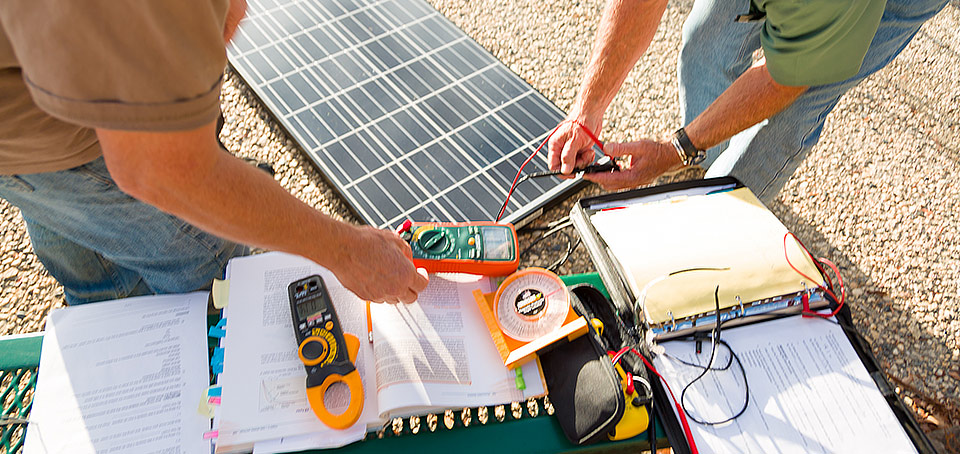
Contact Information

- Division
- Business and Technology
- Dean
- Jay Hester (Interim)
- Associate Dean
- Darlene Jackson

- Division Office
- B 3, Rocklin Campus
Overview
The Construction and Energy Technology curriculum is designed to give students a broad knowledge of the construction and energy industries. Coursework includes job safety, construction skills, work ethics and hands-on laboratory courses to provide trade related skills such as electrical, plumbing, carpentry and photovoltaics. The program provides foundational training for construction management programs as well as training for entry-level employment in the construction industries. The energy and photovoltaics courses provide the fundamental skills needed to excel in an energy sector career. In addition to degree and transfer opportunities, skills certificates are available in the field of photovoltaics.
Faculty
Steve W. Geiger
Assistant Professor, Construction and Energy Technology
B.S., San Jose State University
Construction and Energy Technology Advisory Committee
- Jeff Bailey, Instructor, Roseville High School
- Phil Barnes, Manager, Energy Home Performance, Rocklin
- Jim Bayless, Treasure Homes
- Jon Bertolino, Sacramento Municipal Utility District
- Michelle Bertolino, Roseville Electric
- Jedediah Biagi, Plan It Solar
- Anna Bousouris, Sierra Solar
- Julia Burrows, Valley Vision
- Peter Davis, ATTEI
- Michael Dela Pena, Greentern
- Steve Dolan, Instructor, Roseville High School
- Brett Dotson, SMA-America
- Cheryl Gibson, President, Von-Jac Development, Inc.; Board Member, Placer County Contractors Association, Auburn
- Jim Gragg, SOLAReCITY Electric
- John Hill, Sierra Solar
- Brian Hurd, Hands On Solar
- Darrell Johnson, Pacific Gas and Electric
- Devan Johnson, KW Engineering
- Sue Kateley, CalSEIA
- Rick Larkey, Director, Workforce Development, North State Building Industry Association, Roseville
- Richard Lindstadt, Foresthill High School
- Sue Lunsford, Foresthill High School
- Barbie Lussier-Davis, Owner, Mission West Builders, Cameron Park
- Gil Mathew, Sierra Solar
- Derek Ogden, City of Roseville
- John Orr, Program Consultant, North State Building Industry Association, Roseville
- Steve Paris, Instructor, Del Oro High School, Loomis
- Patrick Remington, Owner, Remington Construction, Auburn
- Jonathan Schwartz, Instructor, Colfax High School
- David Schweickert, Co-owner, Capital City Solar, Roseville
- Erika Schweickert, Co-owner, Capital City Solar, Roseville
- Terry Seabury, Executive Director and CEO, Goweka Solutions, Sacramento
- Terri Shirhall, City of Roseville
- Sam Vanderhoof, Pacific Renewables Group
- Martin Webb, Plan It Solar
- David Weld, Instructor, Oakmont High School, Roseville
- Susan Wheeler, Coordinator, Education Relations, Sacramento Municipal Utility District
- Dan Zeisler, Principal, Chicago Park
Degrees/Certificates
Associate Degrees
Certificates of Achievement
Skills Certificates
Construction Management
AS Degree
The curriculum in Construction Management focuses on providing a broad base of knowledge and skills targeted toward the management of construction operations. The objective of the degree is to provide a foundation for continued study in construction management at a four-year college or university or for employment in the construction industry. The program is oriented toward the practical problems of the construction industry and the curriculum emphasizes subject areas that provide a basis for employment in the industry including business, mathematics and foundational construction courses. Students completing the Construction Management program will find a wide variety of career choices including estimator, construction manager, construction owner, and project manager. For the degree, students must fulfill the following major requirements with grades of “C” or better, complete a minimum of 60 degree-applicable semester units (12 of which must be completed at Sierra College) with a grade point average of at least 2.0, and complete one of the following three general education patterns:
- Sierra College Associate Degree Requirements ;
- California State University General Education Breadth pattern;
- Intersegmental General Education Transfer Curriculum (IGETC) .
Required Courses
| Code | Title | Units |
|---|---|---|
| CET 0001 | OSHA Construction Safety Training | 1 |
| CET 0005 | Introduction to the Built Environment | 3 |
| CET 0020 | Foundations and Framing | 3 |
| CET 0022 | Introduction to Energy Efficiency Construction | 3 |
| BUS 0001 | Financial Accounting I | 3 |
| BUS 0002 | Financial Accounting II | 3 |
| BUS 0003 | Managerial Accounting | 3 |
| ECON 0001A | Principles of Macroeconomics | 3 |
| ECON 0001B | Principles of Microeconomics | 3 |
| MATH 0016A | Calculus for Social and Life Sciences | 4 |
| or MATH 0030 | Analytical Geometry and Calculus I | |
| PHYS 0105 | General Physics I | 4 |
| PHYS 0105L | General Physics I Laboratory | 1 |
| Total Units | 34 | |
Energy Technology
AS Degree and/or Certificate of Achievement
The Energy Technology program prepares students for jobs in the field of renewable energy, such as solar power installation, site supervision, sales, system maintenance and management. Students receive a background in sustainability while gaining specific technical skills related to renewable energy installation. As students complete courses for the degree, they also qualify for two skills certificates in photovoltaics and are prepared to sit for the NABCEP Entry Level Exam. Students must fulfill the following major requirements with grades of “C” or better, complete a minimum of 60 degree-applicable semester units (12 of which must be completed at Sierra College) with a grade point average of at least 2.0 and complete one of the following three general education patterns:
- Sierra College Associate Degree Requirements ;
- California State University General Education Breadth pattern;
- Intersegmental General Education Transfer Curriculum (IGETC) .
A certificate is designed to provide career technical skills; it is not equivalent to an associate degree.
Required Courses
| Code | Title | Units |
|---|---|---|
| CET 0040 | Beginning Photovoltaic Systems | 4 |
| CET 0042 | Intermediate Photovoltaic Systems | 4 |
| CET 0044 | Advanced Photovoltaic Systems | 4 |
| DES 0020 | Architectural Drawing I | 3 |
| ESS 0001 | The Environment and the Human Impact | 3 |
| ESS 0007 | Energy, Environment, and Climate (also ESCI 0007) | 3 |
| Select 6-8 units from the following: | 6-8 | |
| Introduction to Energy Efficiency Construction | ||
| Fundamentals of Construction Documents and Estimating | ||
| Residential House Wiring and Codes | ||
| Residential Building Codes | ||
| Solar Photovoltaic Sales | ||
| Architectural Drawing II | ||
| Conservation of Natural Resources | ||
| Fundamentals of Mechatronics | ||
| Fundamentals of Electronics | ||
| Total Units | 27-29 | |
Residential Building Construction
AA or AS Degree and/or Certificate of Achievement
The curriculum in Residential Building Construction prepares students for entry-level building construction positions, such as carpenter, electrician, plumber and estimator. Credit for up to one and one-half years of the contractor’s examination experience requirement may be granted by the Contractors State License Board for completion of the Residential Building Construction degree. For the degree, students must fulfill the following major requirements with grades of “C” or better, complete a minimum of 60 degree-applicable semester units (12 of which must be completed at Sierra College) with a grade point average of at least 2.0 and complete one of the following three general education patterns:
- Sierra College Associate Degree Requirements ;
- California State University General Education Breadth pattern;
- Intersegmental General Education Transfer Curriculum (IGETC) .
A certificate is designed to provide career technical skills; it is not equivalent to an associate degree.
Required Courses
| Code | Title | Units |
|---|---|---|
| CET 0001 | OSHA Construction Safety Training | 1 |
| CET 0003 | Basics of Construction and Woodworking | 3 |
| CET 0005 | Introduction to the Built Environment | 3 |
| CET 0020 | Foundations and Framing | 3 |
| CET 0022 | Introduction to Energy Efficiency Construction | 3 |
| CET 0024 | Fundamentals of Construction Documents and Estimating | 3 |
| CET 0026 | Residential House Wiring and Codes | 3 |
| CET 0030 | Finish Carpentry | 3 |
| CET 0034 | Plumbing Installation and Design | 3 |
| Select 6-8 units from the following: | 6-8 | |
| Building with Green Construction Materials | ||
| Residential Building Codes | ||
| Beginning Photovoltaic Systems | ||
| Intermediate Photovoltaic Systems | ||
| Advanced Photovoltaic Systems | ||
| Interior and Exterior Finishing | ||
| Production Cabinetry (Traditional) | ||
| Advanced Skill and Speed Development - Concrete | ||
| Advanced Skill and Speed Development - Framing | ||
| Skill and Speed Development-Cabinetry and Furniture | ||
| Architectural Drawing I | ||
| Architectural Drawing II | ||
| Total Units | 31-33 | |
Advanced Building
Skills Certificate
The Advanced Building Skills Certificate curriculum prepares students to work for small to large home builders in a more advanced or managerial role doing carpentry/framing, finishing, job costing, project management or green construction. This skills certificate provides a foundation for students to help prepare their employers for the California State mandate of all new residential construction being “Net Zero” by 2020. A skills certificate is designed to provide career technical skills; it is not equivalent to an associate degree.
| Code | Title | Units |
|---|---|---|
| CET 0007 | Building with Green Construction Materials | 4 |
| CET 0020 | Foundations and Framing | 3 |
| CET 0022 | Introduction to Energy Efficiency Construction | 3 |
| CET 0024 | Fundamentals of Construction Documents and Estimating | 3 |
| CET 0030 | Finish Carpentry | 3 |
| Total Units | 16 | |
Building Basics
Skills Certificate
The Building Basics Skills Certificate curriculum prepares students to work for small to large home builders in a framing, electrical or plumbing role. This skills certificate provides a foundation for students to help prepare their employers for the California State mandate of all new residential construction being “Net Zero” by 2020. A skills certificate is designed to provide career technical skills; it is not equivalent to an associate degree.
| Code | Title | Units |
|---|---|---|
| CET 0020 | Foundations and Framing | 3 |
| CET 0026 | Residential House Wiring and Codes | 3 |
| CET 0034 | Plumbing Installation and Design | 3 |
| Total Units | 9 | |
Construction Basics
Skills Certificate
The Construction Basics Skills Certificate curriculum prepares students to work safely for small to large home builders in a labor role. This skills certificate provides a foundation for students to help employers directly build residential homes. A skills certificate is designed to provide career technical skills; it is not equivalent to an associate degree.
| Code | Title | Units |
|---|---|---|
| CET 0001 | OSHA Construction Safety Training | 1 |
| CET 0003 | Basics of Construction and Woodworking | 3 |
| CET 0005 | Introduction to the Built Environment | 3 |
| Total Units | 7 | |
Green Building
Skills Certificate
The Green Building Skills Certificate curriculum prepares students to work for small to large home builders in a carpentry/framing role. This skills certificate provides a foundation for students to help prepare their employers for the California State mandate of all new residential construction being “Net Zero” by 2020. A skills certificate is designed to provide career technical skills; it is not equivalent to an associate degree.
| Code | Title | Units |
|---|---|---|
| CET 0020 | Foundations and Framing | 3 |
| CET 0022 | Introduction to Energy Efficiency Construction | 3 |
| Total Units | 6 | |
Photovoltaic
Skills Certificate
(formerly offered in the Environmental Studies and Sustainability department)
The purpose of the Photovoltaic Skills Certificate is to provide students with the knowledge and skills required to obtain employment as Photovoltaic System Installers and Technicians. Emphasis is on the critical skill competencies as recommended by the North American Board of Certified Energy Practitioners for entry level photovoltaic systems work. A skills certificate is designed to provide career technical skills; it is not equivalent to an associate degree.
Required Courses
| Code | Title | Units |
|---|---|---|
| CET 0040 | Beginning Photovoltaic Systems | 4 |
| CET 0042 | Intermediate Photovoltaic Systems | 4 |
| Total Units | 8 | |
Photovoltaic Advanced
Skills Certificate
(formerly offered in the Environmental Studies and Sustainability department)
The purpose of the Photovoltaic Advanced Skills Certificate is to provide students with the knowledge and skills required to obtain employment as Photovoltaic System Installers, Technicians and entry-level Designers. Emphasis is on the critical skill competencies as recommended by the North American Board of Certified Energy Practitioners. A skills certificate is designed to provide career technical skills; it is not equivalent to an associate degree.
Required Courses
| Code | Title | Units |
|---|---|---|
| CET 0040 | Beginning Photovoltaic Systems | 4 |
| CET 0042 | Intermediate Photovoltaic Systems | 4 |
| CET 0044 | Advanced Photovoltaic Systems | 4 |
| Total Units | 12 | |
Courses
Understanding course descriptions
CET 0001. OSHA Construction Safety Training
Unit: 1
Hours: 18 lecture
Covers a variety of construction safety and health hazards workers may encounter. Provides safety information to construction workers about employee and employer rights and responsibilities. Emphasizes identification, avoidance, abatement, control, and prevention of job-related hazards on construction sites. Upon successful completion, 10 hour OSHA card issued by instructor. (not transferable)
CET 0003. Basics of Construction and Woodworking
Units: 3
Formerly known as CTC 1 or CTR 1
Advisory: Completion with grade of "C" or better or concurrent enrollment in CET 1
Hours: 108 (36 lecture, 72 laboratory)
Designed to teach the skills required to be successful in the construction and wood working industries. Topics include fundamentals of woodworking, safe operation of hand tools, introduction to woodworking materials, project drawings, and environmentally sound design and construction techniques. Hands-on experience with woodworking tools and materials based on assigned student project(s). (not transferable)
CET 0005. Introduction to the Built Environment
Units: 3
Formerly known as CTR 45
Hours: 54 lecture
Introduction to the building industry: trends, organizations, construction processes, contracting laws, regulations, business aspects and career pathways. (CSU)
CET 0007. Building with Green Construction Materials
Units: 4
Advisory: Completion with grade of "C" or better or concurrent enrollment in CET 1
Hours: 180 (18 lecture, 162 laboratory)
Project-based study of the performance characteristics of building materials using sustainable construction techniques and materials. Includes the basic properties and installation techniques of metals, aggregates, cement products, asphalt products and wood. Safe handling of construction materials and tools. (CSU)
CET 0020. Foundations and Framing
Units: 3
Formerly known as CTR 42
Hours: 108 (36 lecture, 72 laboratory)
Fundamentals of residential foundation and floor system techniques involving layout and construction to include: establishing elevations, site preparation, types of foundation forms, rebar and bolt installation, concrete placement techniques, various types of floor systems, and code requirements specific to the above. Major lab project: construction of a foundation and floor system. Includes use and practices of materials and codes related to California Green Technology and "Net Zero Energy" policies. (CSU)
CET 0022. Introduction to Energy Efficiency Construction
Units: 3
Formerly known as CTR 44
Hours: 108 (36 lecture, 72 laboratory)
Fundamentals of residential framing both conventional and green energy efficient techniques involving layout and construction to include: exterior and interior walls, ceilings, roof systems, stair designs and installation. Major lab project: framing a project in the community. Includes use and practices of materials and codes related to California Green Technology and "Net Zero Energy" policies. (CSU)
CET 0024. Fundamentals of Construction Documents and Estimating
Units: 3
Formerly known as CTR 47 and 48
Hours: 54 lecture
Establishes a vocabulary and understanding of construction related documents including the symbols and detail views of building plans. Cost estimating to include material and labor cost calculations, specifications, problem solving, and bid preparations. (CSU)
CET 0026. Residential House Wiring and Codes
Units: 3
Formerly known as CTR 60
Hours: 108 (36 lecture, 72 laboratory)
Instruction basic to the electrical wiring trade. Inside wiring as applied to residential structures. Electrical service requirements for photovoltaic systems. Use of tools and materials of the trade. Review of the National Electrical Code and the applications and CEC updates due to California Green Technology and "Net Zero Energy" policies. (CSU)
CET 0028. Independent Study
Units: 1-3
Formerly known as CTR 28
Designed for students interested in furthering their knowledge at an independent study level in an area where no specific curriculum offering is currently available. Independent study might include, but is not limited to, research papers, special subject area projects, and research projects. See Independent Study page in catalog. (CSU)
CET 0030. Finish Carpentry
Units: 3
Formerly known as CTR 41
Advisory: Completion with grade of "C" or better or concurrent enrollment in CET 3
Hours: 108 (36 lecture, 72 laboratory)
Fundamentals of woodworking hand tools, power hand tools and woodworking machinery to safely develop knowledge and skills leading to finish trim carpentry. Emphasis on residential construction finish carpentry standards, details, nomenclature, trims, and methods of setting interior and exterior doors, window jamb and trims, closet packs, cabinet installs, wainscoting, stair trim and railings, base and ceiling trims and finished flooring applications. (not transferable)
CET 0032. Residential Building Codes
Units: 3
Formerly known as CTR 52
Hours: 54 lecture
Instruction in building codes for light frame one- or two-story dwellings related to local jurisdictions and the State of California. Application of codes to existing buildings with a study of regulations and abatement procedures for standard frame and ICF green technology buildings. Includes codes related to California Green Technology and "Net Zero Energy" policies. (not transferable)
CET 0034. Plumbing Installation and Design
Units: 3
Formerly known as CTR 62
Hours: 108 (36 lecture, 72 laboratory)
Planning, installing, and maintaining simple waste, water and gas plumbing systems in accordance with good practice and in conformity to local codes and ordinances. Overview of new plumbing techniques. Includes use of materials and codes related to California Green Technology and "Net Zero Energy" policies. (CSU)
CET 0040. Beginning Photovoltaic Systems
Units: 4
Formerly known as ESS 30
Advisory: Completion with grade of "C" or better or concurrent enrollment in CET 1
Hours: 108 (54 lecture, 54 laboratory)
Introduction to photovoltaic concepts, applications, and the solar energy industry. Includes basics of electricity, load estimation, energy efficiency, solar site assessment, photovoltaic system components, sizing, financial analysis, design, installation concepts, and maintenance. This course taken with CET 42 prepares students to sit for the NABCEP PV Entry Level Certificate of Knowledge exam. (CSU)
CET 0042. Intermediate Photovoltaic Systems
Units: 4
Formerly known as ESS 32
Prerequisite: Completion of CET 40 with grade of "C" or better
Hours: 108 (54 lecture, 54 laboratory)
Expands on the fundamentals of photovoltaics with a focus on system design and installation concepts of grid-connected residential and small commercial systems. Topics include detailed system sizing, array layout, mounting on various roof constructions, mechanical and electrical integration as well as related electrical codes and workplace safety standards. This course, taken with CET 40, prepares students to sit for the NABCEP PV Entry Level Certificate of Knowledge exam. (CSU)
CET 0044. Advanced Photovoltaic Systems
Units: 4
Formerly known as ESS 34
Prerequisite: Completion of CET 42 with grade of "C" or better
Hours: 108 (54 lecture, 54 laboratory)
Examines the theoretical and technical dimensions of photovoltaic (PV) systems in detail. Topics include advanced principles of electricity and how they apply to PV systems, commissioning, troubleshooting, net metering laws, local codes, and National Electric Code PV requirements. Off campus activities required.(CSU)
CET 0046. Solar Photovoltaic Sales
Units: 3
Advisory: Completion with grade of "C" or better or concurrent enrollment in CET 40
Hours: 54 lecture
Introduction to photovoltaic sales concepts and the solar energy industry. Includes basics of photovoltaic marketing, sales, incentives, site usage, site assessment, photovoltaic system components, system sizing, financial analysis, and sales communication techniques. (not transferable)
CET 0050. Interior and Exterior Finishing
Units: 3
Formerly known as CTC 24 or CTR 24
Hours: 108 (36 lecture, 72 laboratory)
Focus on removal and preparation of existing and new finishes, sanding, masking, caulking, applications of stains, shellac, varnishes and lacquers, interior and exterior painting with primers and paint, use of brushes, rollers and spray systems, HVLP and airless. (not transferable)
CET 0060. Production Cabinetry (Traditional)
Units: 3
Formerly known as CTC 5 or CTR 5
Advisory: Completion with grade of "C" or better or concurrent enrollment in CET 3
Hours: 108 (36 lecture, 72 laboratory)
Economy and custom grade conventional case construction revolving around industrial standards, joinery, processes, structures and hardware of residential case structural systems. Also includes computer-aided spatial designs. Lab work shall be instructor-initiated case structures for a residential project. (not transferable)
CET 0070A. Advanced Skill and Speed Development - Concrete
Units: 3
Formerly known as CTR 37A
Prerequisite: Completion with grade of "C" or better or concurrent enrollment in CET 20
Hours: 108 (36 lecture, 72 laboratory)
Designed to provide an advanced level of skill, speed, and experience for concrete students. Continued in-depth study of materials acquisition, scheduling, detailed layouts, forming for foundations or other applications using concrete as a base. Uses extensive problem solving in the completion of a department selected project. (not transferable)
CET 0070B. Advanced Skill and Speed Development - Framing
Units: 3
Formerly known as CTR 37B
Prerequisite: Completion with grade of "C" or better or concurrent enrollment in CET 0020 or 0022
Hours: 108 (36 lecture, 72 laboratory)
Designed to provide an advanced level of skill, speed, and experience for framing students. Continued in-depth study of materials acquisition, scheduling, detailed layouts for framing structures, to include floors, walls, rooms, and roofs. Uses extensive problem solving in the completion of a department-selected project. (not transferable)
CET 0070C. Skill and Speed Development-Cabinetry and Furniture
Units: 3
Formerly known as CTC 35 or CTR 38
Prerequisite: Completion with grade of "C" or better or concurrent enrollment in CET 3
Advisory: Completion of CET 60 with grade of "C" or better
Hours: 108 (36 lecture, 72 laboratory)
Designed to further develop skill, speed, and experience capabilities to advance knowledge in construction technology. In-depth study of architectural woodwork standards; extensive problem solving in student-selected laboratory projects. (not transferable)
CET 0095. Internship in Construction and Energy Technology
Units: 0.5-4
Formerly known as CTR 95
Designed for advanced students to work in an area related to their educational or occupational goal. Provides new on-the-job technical training under the direction of a worksite supervisor, allowing students to expand knowledge and skills in the chosen field. Mandatory orientation session and faculty approval to determine eligibility. Students may earn up to a total of 16 units in internship courses (any course numbered 95 and PDEV 94). (CSU-with unit limitation)
Program Student Learning Outcomes (PSLOs)
- Demonstrate a fundamental understanding of the construction and energy industries and identify career pathways and opportunities.
- Identify code compliant construction.
- Demonstrate safety compliance in the construction and energy industries.
- Utilize fundamental building principles to lay out and construct structures and systems.
- Explain the principles of Green Building and prescribe building solutions utilizing emerging technology.



